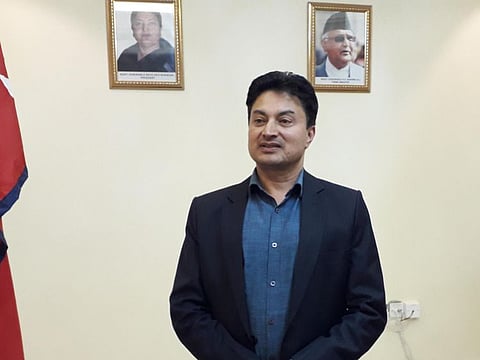Get work permits before coming to UAE, Nepalese jobseekers told
Minister highlights dangers of exploitation in the hands of dubious agents

ABU DHABI: Many jobseekers coming to the UAE from Nepal do not secure work permits from their home country, laying themselves open to exploitation by unscrupulous agents, a top minister of the Nepal Government has said.
Speaking to Gulf News in an exclusive interview during a recent visit to Abu Dhabi, Nepalese Labour Minister Gokarna Bista said failure to obtain “work permits” from the Nepal Labour Ministry results in a large number of Nepalese to fall prey to fraudsters and dubious agents.
Many of the 250,000 Nepalese, who reside in the UAE, first came here on visit visas and changed their residency status after landing jobs, he said, adding that the trend is a cause of major concern for the Nepal Government.
Bista said because of this trend, Nepalese workers frequently run into problems with agents. The rising number of complaints from Nepalese workers in this regard and the financial burden on its missions to resolve the cases are a big worry, he added.
'Obtain legal work permits'
Withoutt work permits, he said, the Nepal Government is unable to maintain job profiles of overseas workers and assist them in protecting their rights – whether it is for compensation, financial assistance, settlement of disputes, provision of airfare or repatriation in the event of accidents, death etc.
“We are doing all we can to spread the word among the community. The Nepalese must obtain legal work permits from the ministry before travelling overseas. That way, we can maintain a record and ensure they get all benefits,” he said.
The Government of Nepal introduced the Foreign Employment Act in 2007 to issue work permits at a nominal cost to workers who wish to travel overseas for jobs and maintain their records, protect them from exploitation, assist them in distress and compensate their families in case of an accident or death.
“Each labour who wants to travel overseas for work purposes should get the labour permit from the Labour Ministry of Nepal,” Bista said.
Visit visa problems
Replying to a question on the Nepalese who come to the UAE on tourist visas and later change their residency status as domestic workers, the minister said it’s against the rules of Nepal which stopped sending maids to the region over five years back, following a spate of complaints.
“Still, they come and work as domestic workers. The legal work permit will also minimise visit visa-related problems,” he said.
Around 150,000 Nepalese travel to the UAE each year, he said, adding, “The Government of Nepal is serious about ensuring a dignified and humanitarian work environment for our workers – it’s very important apart from wages and benefits.”
He said unscrupulous agents charge workers huge sums of money in the name of service and processing applications, which is unacceptable.
In this regard, the UAE and Nepal signed an agreement in April to ensure workers their rights, including zero-cost of hiring. “Now, we are in the phase of implementing this [zero-cost of hiring] agreement,” he added.


